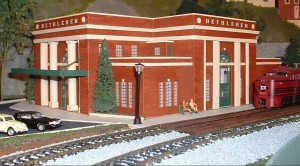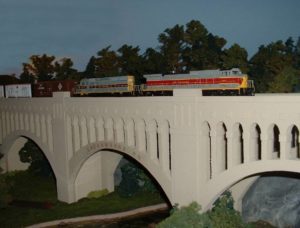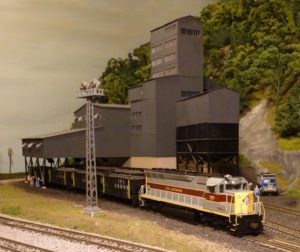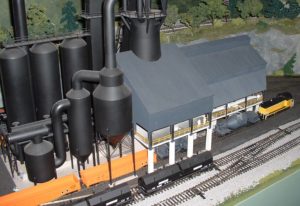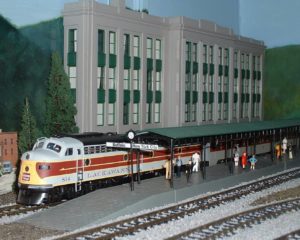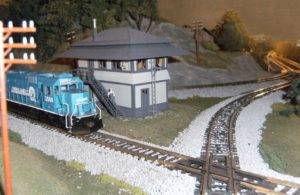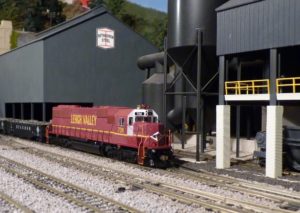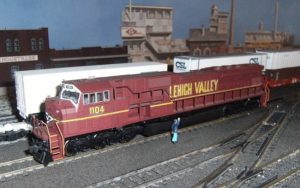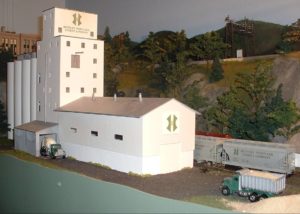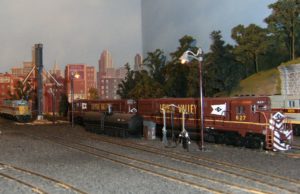Not having a lot of space (about a 12′ x 9′ third floor room), I settled for 18″r minimum curves in order to fit everything I was interested in modeling. Using easements and scenic details to disguise the sharp curves, the appearance doesn’t suffer too much. My railroad is modeled for the late 1980s to the present, but for variety I can simply switch some details to slip back a couple of decades into the past.The Lehigh Lackawanna was formed when the Lehigh Valley and Erie Lackawanna pooled resources in order to stay out of Conrail. Geography of the HO scale layout represents the LV and EL as they follow a combined route starting on former Valley trackage from NYC-area ports across New Jersey to Bethlehem. The route continues up the Lehigh Gorge to a connection with Lackawanna trackage at Pittston, PA, and heads towards Buffalo.
New Jersey is represented by staging tracks under the layout, but Bethlehem (my home town) is fully accounted for, including a Bethlehem Steel blast furnace and mill buildings. I have also scratch built the Lehigh Valley/Reading passenger station which has been restored as part of St. Luke’s Hospital. On my layout the plate girder bridge connection to Allentown Yard is part of a branch line that leads to a cement plant in the imaginary town of Stewart’s Haven.
From Bethlehem trains duck under the Hill To Hill bridge and climb up into the Poconos (the EL emerges from hidden tracks) into Taylor Yard on the second level. There is a connection here to a kitbashed representation of the Lackawanna Station.
Past Scranton are a couple coal mines/breakers, then a compressed Nicholson Viaduct as trains head down the other side of the mountains to the yard in Buffalo. The east end of the yard includes the engine facilities, including diesel fuel racks, sand tower and an engine shop. Beyond the western end of the yard is another return loop and staging tracks.
The management of Lehigh Lackawanna adopted a diamond logo to honor the memory of the two anthracite roads. The nostalgic crews showed their preference for using equipment particular to their railroads and management decided just to stick with Lehigh Valley and Erie Lackawanna schemes. Plus, the railfans love it!
The “Double L” engine roster includes those appropriate to the two railroads from the late ’60s – early ’70s that have been “overhauled” for modern use: mainly geeps for the Valley and SD45s for the Lackawanna. I enjoy painting modern “fantasy” engines so a LV SD80MAC and AC4400 appear on the layout, as well as an EL SD40-2 and C44-9W. I also like to imagine that Conrail survived into the present – I appreciate seeing the blue engines more now, after seeing so much Norfolk Southern blehck.
Lehigh Lackawanna management is very conscious of public image and organizes several special trains through the year, including trips for holiday shopping, NHL hockey, NFL and NCAA football games. The shops maintain several vintage engines to pull the passenger equipment used on these excursions, such as a Lackawanna E8 unit, as well as a Valley F3 and Alco PA.
Glen Larimer (golarimer at gmail dot com)
Royersford, PA

